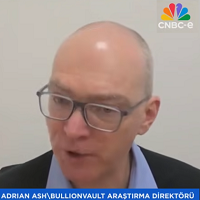Growing Rich? What's Your Edge?
Not in bonds, stocks or crypto...
"NO WARNING can save a people determined to grow suddenly rich," says Tim Price at Price Value Partners.
These words of Samuel Jones Lloyd, later Lord Overstone, were written in 1888, in response to the loans flooding into the booming Argentinian economy of the time.
But they might as well have been written yesterday. And they could easily apply to any financial market in 2025.
Tellingly, they were written about the bond market, rather than stocks. It matters little, because today both markets look wildly overvalued, albeit bonds are now, in our view, far more dangerous.
Both bond and stock markets, however, look like small beer compared to the literal fortunes being made – and lost – overnight by the unwary in the cryptocurrency market today.
As we never tire of pointing out, to harvest superior returns from the market, you need to have some kind of edge. If you do not know what your edge is, you do not have one.
The best edge for most of us, we suggest, should be a value-oriented approach to investing. The second best edge is probably momentum – a shorter term trading mentality that is more agnostic about underlying quality (we accept that these two approaches are, philosophically, poles apart; in our asset management business, being mindful of their disparate attributes, we use both).
Meanwhile, nothing seems able to dent the euphoric spirits at play in the markets. Not worries about the economy, or politics, or ongoing wars, or the ongoing chaos of Trump administration 2.0.
The most recent Bank of America Merrill Lynch fund manager survey has fund managers' allocation to cash at 3.9%, its second-lowest level in 12 years. Meanwhile, the risk level in fund manager portfolios reached its highest level on record, dating back to 2001. This comes as fund managers' allocation to technology stocks saw its largest 3-month increase since 2009. The only way to rationalise this is to resort to the psychology of the herd.
As Keynes suggested, it is deemed better for fund managers to fail collectively rather than have an individual manager strike out on his own:
"Worldly wisdom teaches that it is better for reputation to fail conventionally than to succeed unconventionally."
While adopting the behaviour of the herd may ensure the survival of the herd, it does nothing for the client. Revulsion at this bovine selfishness, especially at the peak of the market, is what drove us to embrace the principles of absolute return investing, as opposed to market-relative investing, well over two decades ago.
If broad equities look problematic, the problems facing bond investors look existential. As we wrote in 'Investing Through the Looking Glass' (published back in November 2016), there is a terrible problem at the heart of the bond market, in the form of what can best be called agency risk.
The bond market is an institutional market; with the average ticket size in bonds being of the order of $5 million or so, only the wealthiest private investors tend to own individual bonds. Most of the time, most of the market is held by institutional investors – pension funds, insurance companies or other large fund managers – on behalf of the man in the street. But those funds and their managers have no incentive to stray from the herd.
Most of the time, in most funds, the manager himself has little or no skin in the game. So it will be no great loss for him if he loses money in absolute terms, provided he does so from within the apparent safety of the herd. Bond fund managers are typically assessed by comparison with a global bond benchmark, like the JP Morgan Global Bond Index. These indices typically have their largest allocations to the largest bond markets.
Think about that for just a second. Bond fund managers are obligated to own the largest bond markets over any other. But the largest bond markets are a reflection of the most heavily indebted governments. They are not an indication of credit quality – quite the reverse.
Bond fund managers pursuing the wrong benchmarks are pouring money into expensive sovereign bond markets that will trigger huge losses for their investors as interest rates rise – as they are now doing. (In early 2020, for example, the 30 year UK Gilt yielded less than 0.7%. It now yields over 5.5% and is likely heading higher.) Bond fund managers aren't risking their own personal capital, so they will continue to try and meet the narrow demands of their (inappropriate) institutional mandates.
Now that interest rates are finally starting to rise, the bond market no longer has the potential to make any further dramatic gains – they are all in the past. But it does have the potential to inflict disastrous capital losses on bond investors.
Doug Noland for the Credit Bubble Bulletin:
"In one way or another, the Trump administration will move to seize control of monetary policy. They surely view that controlling the levers for incentivizing levered speculation is an imperative for sustaining speculative Bubbles, economic expansion, and political control.
"Their radical agenda and approach have already unnerved traditional investors internationally. The Dollar index is down about 10% y-t-d, while data and myriad anecdotes point to central bank and institutional Treasury liquidations. It's reasonable to assume that waning international demand has been offset by only greater levered holdings of Treasuries and agency securities.
"Market structure indicates extraordinary market vulnerability. Can the administration sustain leveraged speculating community risk embracement? Will serious de-risking/deleveraging be held at bay?
"The Treasury market has of late deflected what would have normally been troubling developments (ie, tariffs, inflation, deficits, attacks on Fed independence, state interventionism, BLS firing...). Confidence has held that looser monetary policy is imminent. The "Trump put" is the markets' reliable first line of defense, with the "Fed put" – lower rates and open-ended QE liquidity – available when things turn dicey.
"Much has changed since Alan Greenspan was the exclusive conductor of the leveraged speculating community. Especially after 16 years of global government finance Bubble excess, speculative leverage permeates international markets and the entire global financial system. Even if the administration commandeers the Fed and US monetary policy, there are international factors that significantly impact the leveraged speculating community and markets more generally.
"I do take note of global bonds trading as if yields could make a surprising lurch higher, while US investment-grade spreads trade to "the lowest since 1998" – during carefree summertime days leading up to Autumn's cataclysmic Long-Term Capital Markets/Russia meltdown.
"On a related subject, there are unfolding AI developments worthy of mention. The historic AI mania and arms race are sucking up enormous amounts of finance. They become only more acutely vulnerable to de-risking/deleveraging. There are other significant festering risks, including energy limitations and 'AI delusion'. AI concerns could provide a catalyst for general market de-risking."
For the more risk-averse investor, we would rather hold cash than bonds. But then we'd rather own gold than either. At this critical juncture in monetary history, we believe that gold is regaining its status as the premium form of money par excellence. Liquidity gives you optionality and breathing space. More to the point, at a time when most markets are wrestling with what seems like extreme overvaluation, let's not forget what Warren Buffett said about the potential afforded by cash (in our world, bullion) in the event of a market collapse:
"Cash combined with courage in a crisis is priceless."
Having some dry powder in your portfolio will make a great degree of sense when that long overdue correction finally arrives. It will enable you to take advantage of opportunities that others will have to ignore because they are already fully invested. And the likes of gold also keep you diversified at a time when the diversification benefits of owning bonds are outweighed by the potential risk to your capital of holding debt instruments in an environment of rising interest rates.
We choose to complement our bullion holdings with sensibly priced mining shares and also systematic trend-following funds that have historically had little or no correlation to stocks or bonds.
The objective of our discretionary investment service is not to make our investors suddenly rich. It is to keep our investors wealthy during a period of acute financial threat. And clearly, also to generate what will hopefully be some decent returns from a portfolio of sensibly diversified investments across asset classes that themselves make evident sense.









 Email us
Email us